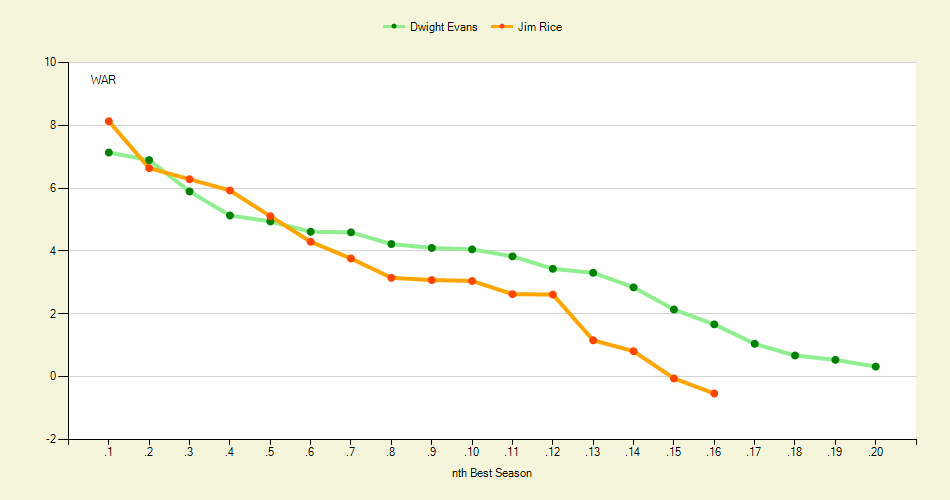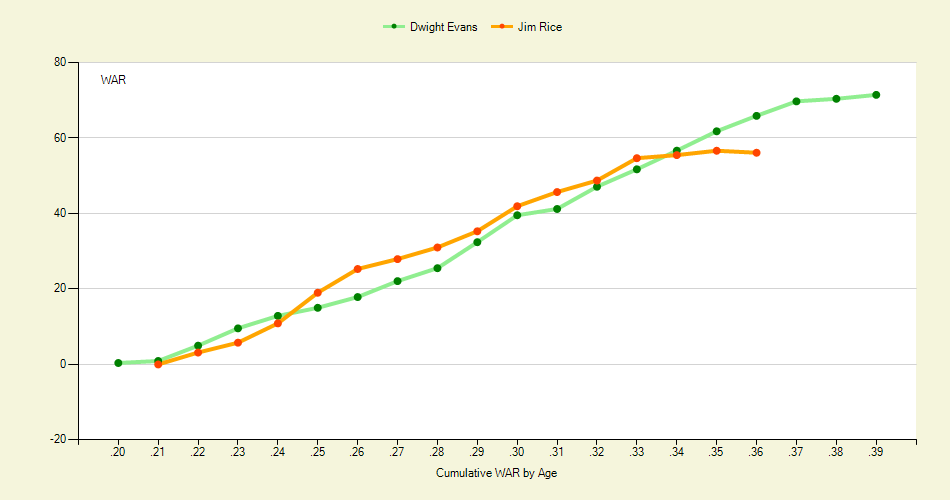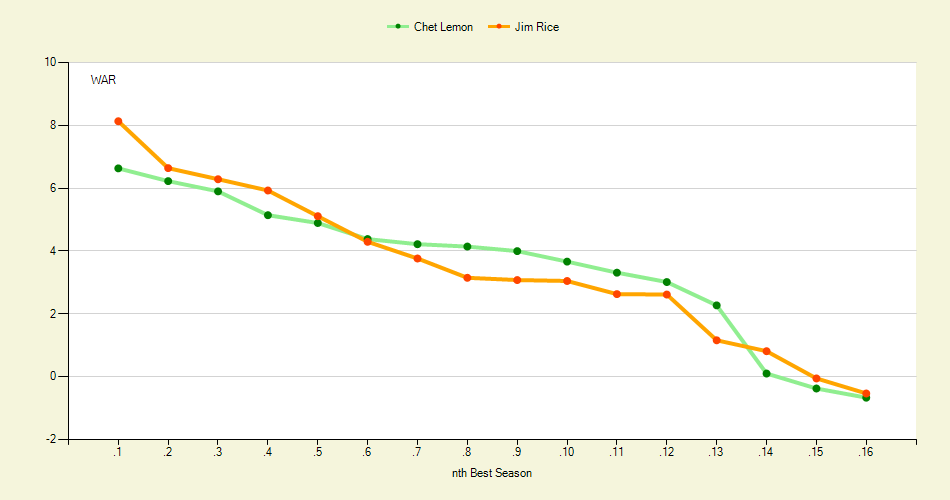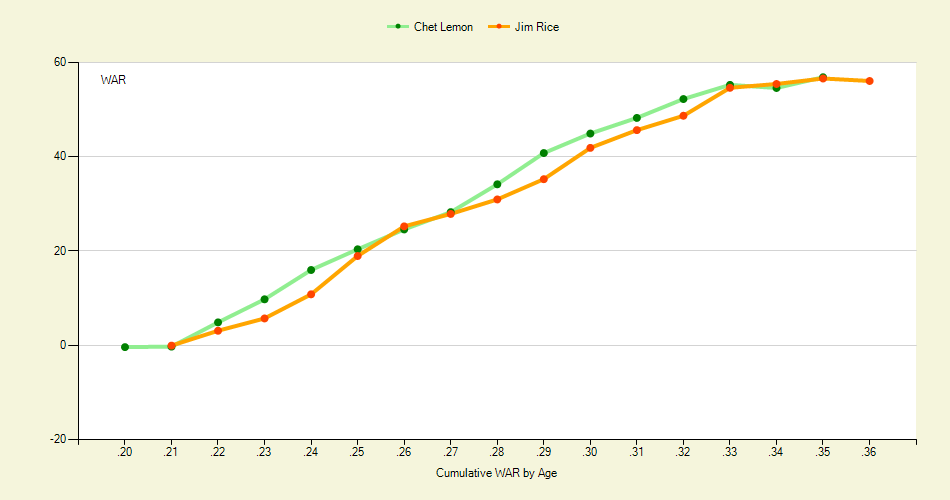Inspired by Mike Axisa's new Twitter feed, @WARGraphs, I have been playing around with a new tool, or at least one that's new to me. As you may know, WAR Graphs is a Fangraphs feature where you can compare up to four players by Wins Above Replacement. Once one enters their desired search, three graphs appear. One shows how the players compare in their nth best seasons. The second shows how they compare year-by-year over the course of their careers. The final one shows how they stack up by age.
It's a neat tool, and a handy one when like-minded folks are looking to settle a quick dispute. For instance, as a Red Sox fan, a pet issue of mine has been the travesty that is Jim Rice's Hall of Fame enshrinement while Dwight Evans never amassed more than eight percent of the vote. Anyway, here are two of the three WAR Graphs for a Rice and Evans comparison.


Because the topic is something of an obsession for me, I tweeted my findings from this WAR Graphs search last night.
Jim Rice & Dewey were similar, if you ignore Dewey's 35-40 seasons when he hit .283/.387/.470 (133 OPS+) http://is.gd/jFVpAless than a minute ago via TweetDeck Patrick Sullivan
Patrick Sullivan
PatrickSull
When he saw this, Dave Cameron responded with the following:
@PatrickSull My favorite - run Jim Rice against Chet Lemon; pick up jaw.less than a minute ago via TweetDeck David Cameron
David Cameron
d_a_cameron
And sure enough, here is the WAR Graphs comparison of Rice and Chet Lemon.


Chet Lemon and Jim Rice are more or less indistinguishable. Chet. Lemon.
**********
All of this was a long and graphical way of setting up the point of this post, which is to articulate a coherent way to think about WAR in the context of Hall of Fame voting. Jonah Keri has done a really nice job advocating for Tim Raines in a more visceral way than Rich Lederer has for Bert Blyleven. Rich has gradually won over voters by reminding them time and again of Blyleven's statistical dominance. Keri, on the other hand, will make his case with stats, but also with well-supported assertions along the lines of had Rickey Henderson never come along, Raines may well be regarded as the finest lead-off man ever. That resonates more than a WAR Graph with many.
To take it a step further, not only is something like WAR altogether unpersuasive to some, but when many see the WAR Graph above of Jim Rice and Chet Lemon, their gut may be to write off the statistic itself altogether. In other words, it's not that the graph shows that Rice and Lemon were comparable. No, the graph shows that WAR as a statistic is moronic.
But here's the thing about WAR. It lines up with so much of what we understand to be true, even before we start in on any sort of advanced statistical analysis. Here's a list of the top-10 position players by B-Ref WAR:
1. Babe Ruth
2. Barry Bonds
3. Ty Cobb
4. Willie Mays
5. Hank Aaron
6. Tris Speaker
7. Stan Musial
8. Rogers Hornsby
9. Eddie Collins
10. Ted Williams
The next five on the list are Mickey Mantle, Lou Gehrig, Honus Wagner, Rickey Henderson and Mel Ott. We are talking baseball royalty. It's not as though Nomar Garciaparra or someone crept into the top of the list because of some quirk in the statistic. It actually aligns beautifully with a list your grandfather might furnish you of the very best baseball players of all time.
Here are the top pitchers:
1. Roger Clemens
2. Walter Johnson
3. Tom Seaver
4. Pete Alexander
5. Lefty Grove
6. Phil Niekro
7. Greg Maddux
8. Gaylord Perry
9. Warren Spahn
10. Randy Johnson
The next five? BERT BLYLEVEN, Christy Mathewson, Bob Gibson, Nolan Ryan and Steve Carlton. Nobody is saying that this is the definitive list of the best pitchers of all time, ranked perfectly in order. Peak matters, for instance, and I don't want to speak for anybody else but I don't think you'll find too many stat heads saying that Niekro, Perry or Blyleven were better than Pedro Martinez or Sandy Koufax. But the point remains the same: that's a pretty darn good list in terms of how it compares to common baseball wisdom of the very best pitchers ever.
There are single-season examples, too, of the visceral or instinctive aligning with analytical conclusions. Growing up, I heard non-stop stories from my father and grandfather of how great Carl Yastrzemski was for the 1967 Impossible Dream Boston Red Sox. We would listen regularly to the WHDH-produced soundtrack to that season, including the ragtime adaptation a song whose chorus went "Caaaahhhhrrrll Yastrzemski" over and over again. Later in life, my father in law, a Long Beach, California native who studied law in Boston during the 1967 season, would tell me one story after another about how incredible Yaz was. This is a man who is no Red Sox supporter, and as prone to hyperbole as anyone you could meet. Given everything I had heard throughout my life about Yaz in 1967, you'd have thought he had one of the very best seasons ever. Having bought in more and more to advanced statistical analysis, I just assumed all of this was overblown.
Well you know what? Yaz did have one of the very best seasons ever. Go on and check it out. Aside from three insane Barry Bonds seasons, Yaz's 1967 stands as the finest year by a position player since 1958. All of that wonderful stuff I had heard about Yaz, all of what seemed like folklore, it ALL lined up perfectly with what WAR would tell you about Yaz's heroics in 1967. It was one of the truly great single seasons in baseball history.
When I see a graph like the one above of Lemon and Rice, I don't immediately assume Lemon was better than Rice or even that Lemon was the same caliber of player Rice was. I'm more skeptical of defensive data than offensive, and I have a ton of respect for what Rice did at his peak. But that's not how WAR is supposed to work, or at least it's not how I think it should work. Instead, I believe it should be your first pass.
Oh, I see here that Blyleven ranks 11th all time and Morris 119th. I probably would be wrong to vote in Morris then, and not Blyleven.
Huh, look at this: Tim Raines ranks 55th all time and Lou Brock 121st. Maybe I need to think a little differently about Raines's candidacy?
In the Rice and Lemon case, it just shows that maybe we've thought a bit disproportionately about both players. Rice is in the Hall of Fame while Lemon, well I hadn't even thought about Chet Lemon in over a decade. That doesn't seem right to me anymore now that I have taken Dave Cameron's suggestion to run the comparison.
WAR is not perfect but it cannot be ignored, either. My hope is that more Hall of Fame voters will look to the stat to help frame their decisions. If a certain player amassed many of his Wins Above Replacement in exceedingly favorable conditions, no problem. Dock him. If WAR sells short a player like Morris or Rice for whatever reason, you can make that case too. All I ask is that voters recognize how well the statistic holds up to everything we understand to be true about baseball. More often than not for the attentive baseball fan or writer, a quick pass at WAR will serve more as affirmation than an eyebrow-raising contradiction. That being the case, when it does not quite align with pre-conceived beliefs, it merits further investigation and not immediate write-off.
- Subscribe to Baseball Analysts using Google Reader
- Get started using Google Reader to easily keep up with all your favorite sites